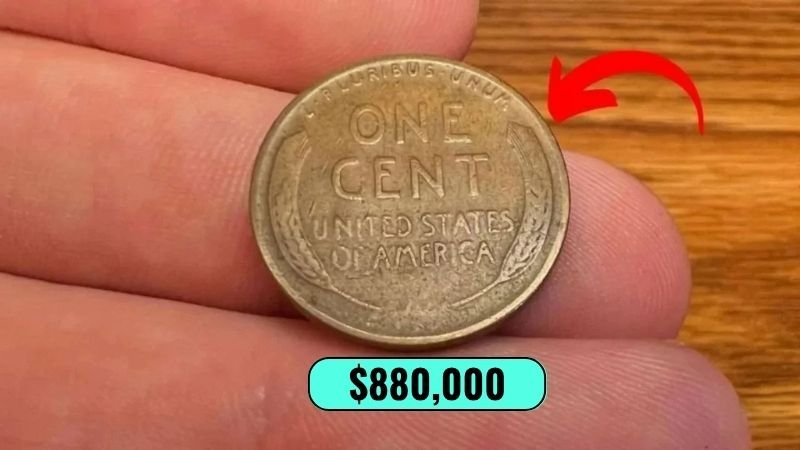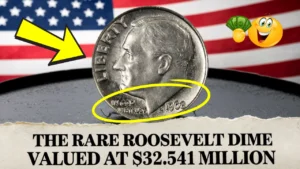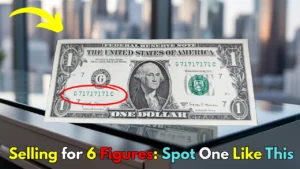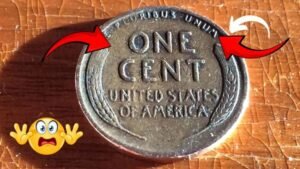Have you ever looked at the change in your pocket and wondered if one of those old coins might be worth a small fortune? Well, buckle up — because one tiny copper coin, a Lincoln Wheat Penny, has fetched a jaw-dropping $880,000 at auction. And yes, it might still be hiding in someone’s pocket, piggy bank, or coin jar right now.
In this blog post, we’ll explore why this little coin is so valuable, what makes it rare, and how you might just stumble across one. Whether you’re a seasoned collector or just curious, this guide is full of fascinating facts, tips, and possibilities that could turn your spare change into serious cash
The Lincoln Wheat Penny, minted from 1909 to 1958, is one of the most iconic U.S. coins. It features President Abraham Lincoln on the obverse (front) and two wheat stalks on the reverse (back), symbolizing national prosperity.
It was the first U.S. coin to depict a real historical figure, breaking away from the tradition of using allegorical images. While most of these pennies are only worth face value or a few cents more, some rare varieties have stunned the world — especially the one that sold for $880,000.
A Brief History of the Lincoln Wheat Penny
The Lincoln cent was introduced in 1909, to mark the 100th anniversary of Lincoln’s birth. Designed by Victor David Brenner, it replaced the Indian Head cent and became an instant hit. The coin was minted in Philadelphia, Denver, and San Francisco.
Key milestones include:
| Year | Highlight |
|---|---|
| 1909 | First issued; controversy over the initials “V.D.B.” on the reverse. |
| 1943 | Wartime steel penny replaces copper for one year. |
| 1955 | Famous for a major double-die error. |
| 1958 | Final year of the wheat reverse before transitioning to the Lincoln Memorial reverse in 1959. |
Why Is One Lincoln Wheat Penny Worth $880,000?
So, what made this particular penny so valuable?
In the world of coin collecting, rarity, condition, and historical error are the golden trio. The 1943 bronze Lincoln Wheat Penny checks all those boxes. That year, pennies were supposed to be minted using zinc-coated steel to save copper for the war effort. But a small number — likely less than 20 — were mistakenly struck in bronze.
🔥 Why It’s Worth So Much:
- Extremely rare: Only a few confirmed to exist.
- Mint error: Bronze used instead of wartime steel.
- High-grade condition: Graded MS-63 (Mint State) or higher.
- Auction demand: Intense bidding from elite collectors.
What to Look for: Key Features of Valuable Lincoln Pennies
If you’re checking your change, here are the features to look for in a potentially mega-valuable Lincoln Wheat Penny:
🕵️♂️ Checklist of Features:
| Feature | Details |
|---|---|
| Date | Look for 1943 bronze (should not stick to a magnet). |
| Mint Mark | “S” (San Francisco) or “D” (Denver) versions may increase value. |
| Weight | Bronze pennies weigh about 3.11 grams; steel ones are lighter. |
| Errors | Double die, off-center strikes, missing letters, etc. |
| Condition | Uncirculated coins (Mint State) are worth significantly more. |
Comparison Table: Common vs Rare Lincoln Wheat Pennies
| Coin Type | Description | Approx. Value |
|---|---|---|
| 1943 Steel Penny | Common wartime issue | $0.05–$1 |
| 1943 Bronze Penny | Rare error coin | $100,000–$880,000+ |
| 1955 Double Die | Misaligned strike | $1,500–$25,000 |
| 1909-S VDB | First issue with designer’s initials | $700–$5,000 |
| 1944 Steel Penny | Another rare error | $75,000–$375,000 |
Expert Tips to Identify and Preserve Rare Pennies
Want to find or keep one of these treasures? Here are tips straight from the pros:
🧠 Pro Collector Tips:
- Use a magnet: If your 1943 penny sticks, it’s steel. If not, test it further!
- Weigh it: Invest in a jeweler’s scale; bronze is heavier.
- Preserve properly: Store coins in acid-free holders or coin flips to avoid corrosion.
- Get it graded: Use PCGS or NGC to get your coin authenticated and valued.
- Don’t clean it!: Cleaning can reduce a coin’s value by hundreds or thousands.
Famous Sales and Record-Breaking Prices
Let’s look at some real-world examples of Lincoln Wheat Pennies making headlines:
| Year Sold | Coin Description | Sale Price |
|---|---|---|
| 2010 | 1943-D Bronze Penny (NGC MS-64BN) | $1.7 Million |
| 2019 | 1943 Bronze Penny (MS-63BN) | $880,000 |
| 2018 | 1955 Double Die | $24,000 |
| 2007 | 1909-S VDB | $5,500 |
These sales show that the coin market remains strong, with passionate collectors constantly on the lookout.
FAQs About Valuable Pennies
How can I tell if my penny is valuable?
Check the date, weight, material, and condition. If it looks unusual, get it appraised.
Is the 1943 copper penny magnetic?
No. The copper version won’t stick to a magnet, unlike the steel version.
What’s the rarest Lincoln Wheat Penny?
The 1943-D Bronze Cent is among the rarest and most valuable.
Where can I sell a rare penny?
Consider auction houses, coin dealers, or online platforms like Heritage Auctions or GreatCollections.
What’s the best way to store valuable coins?
In a dry, temperature-stable environment using acid-free holders or coin capsules.
Conclusion: Is There a Fortune in Your Pocket?
The next time you get change back at the store or crack open that old jar of coins, take a closer look. The Lincoln Wheat Penny worth $880,000 was once just another coin in circulation. These rare finds are a reminder that history — and hidden wealth — could be in the palm of your hand.
Whether you’re an amateur hobbyist or a serious collector, this story reignites the thrill of the hunt. Want to dive deeper? Consider researching other rare coins like the Bicentennial Quarter, Buffalo Nickel, or Liberty Head Dime — because you never know what you might find next.




